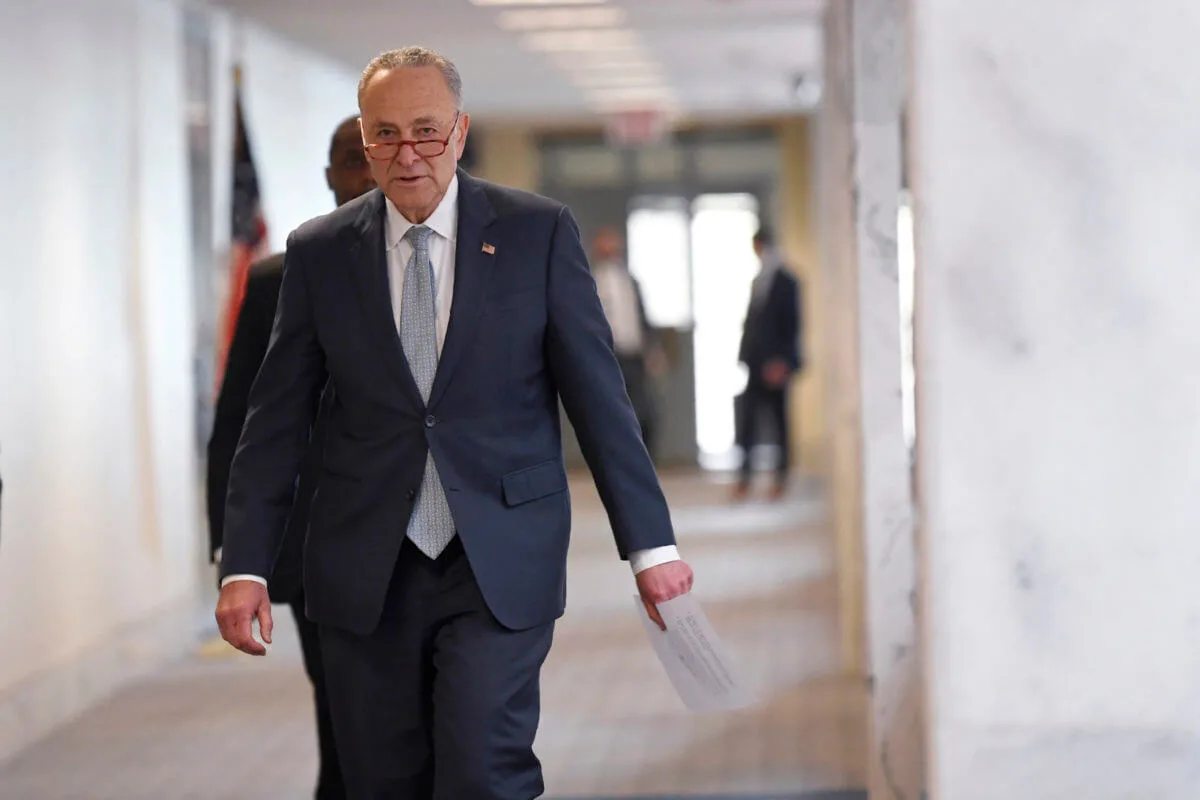
AP Photo/Susan Walsh
Lawmakers said the coronavirus aid proposal prioritized bailing out corporations over American workers.
Senate Majority Leader Mitch McConnell held a key procedural vote Sunday night to advance a nearly $2 trillion stimulus package aimed at addressing the economic fallout related to the novel coronavirus—despite the fact that negotiations were still ongoing. The measure failed in a 47-47 vote along party lines.
McConnell quickly blamed House Speaker Nancy Pelosi for derailing the talks. “We were doing a good job of coming together until this morning, when the Speaker showed up — we don’t have a Speaker in the Senate, that’s in the House — and when the leader [New York Sen. Charles Schumer] and the speaker came in [they] blew everything up,” he said on the Senate floor Sunday evening.
Democrats, however, pointed out that there were still a number of problems that needed to be worked out before they could take a vote to move forward on the package. Delaware Sen. Tom Carper also told The Hill that his party “sensed a sort of change in attitude, an unwillingness to give and negotiate, for reasons we don’t fully understand” the night before.
The setback—which triggered Dow futures to drop Sunday evening by 5%, the maximum limit—comes after several days of talks between senators and administration officials on a bipartisan compromise to help Americans financially devastated by the global pandemic that has spurred mass layoffs across the country, with millions more likely. Between March 8 and 14, 281,000 people filed for unemployment, the Department of Labor reported.
The latest version of the proposed economic stimulus package, introduced by McConnell, would directly send $1,200 to most American adults and funnel $350 billion to help small businesses (that is, companies with 500 employees or less) stay afloat.
The main problem for Senate Democrats, however, had to do with a $500 billion program created by the proposal that would offer loans to corporations at the discretion of the administration—a move that’s reminiscent of the immensely unpopular Wall Street bailouts during the 2008 financial crisis.
The current coronavirus relief plan, according to the Washington Post, gives the Treasury Department power to decide how to disperse those funds without congressional oversight. Democrats have coined the program a “slush fund,” which includes $50 billion for passenger airlines, $8 billion for cargo airlines, $17 billion for companies considered essential for national security, and the rest going toward businesses, and local and state governments.
Essentially, according to Democrats, the plan is “a corporate bailout” that offers few protections to workers. Other concerns included stock buyback language, a need for more funding for health care workers and hospitals, and an expansion of unemployment benefits.
“In the midst of an unprecedented national crisis,” Washington Sen. Patty Murray said in a statement, “Republicans can’t seriously expect us to tell people in our communities who are suffering that we shortchanged hospitals, students, workers, and small businesses but gave big corporations hundreds of billions of dollars in a secretive slush fund.” Murray represents one of the states hit hardest by the coronavirus outbreak.
Senate Minority Leader Chuck Schumer tweeted Sunday evening that the Democratic caucus voted no on the bill—the third coronavirus relief package being considered by Congress—because “among other problems it includes huge bailouts without protections for people and workers and without accountability, and because it shortchanges our hospitals and healthcare workers who need our help.”
Schumer has remained committed to finding a path forward on the much needed stimulus package, and reportedly met with Treasury Secretary Steven Mnuchin six times on Sunday alone.
Earlier in the day, he also joined Mnuchin, Pelosi, McConnell, and House Minority Leader Kevin McCarthy (R-CA) in another meeting to work out their differences on the package. Ultimately, however, Pelosi left the meeting and told reporters: “We’ll be introducing our own bill and hopefully, it will be compatible with what they discussed in the Senate.”
Five Republicans missed Sunday night’s vote. Earlier in the day, Kentucky Sen. Rand Paul—who was the only senator to vote against an $8.3 billion coronavirus emergency aid package and also rejected legislation offering free coronavirus testing and paid sick leave for Americans affected by the outbreak—announced he had tested positive for COVID-19. Afterward, Sens. Mike Lee and Mitt Romney from Utah both said they would self-quarantine because they’d been in close contact with Paul.
Sens. Cory Gardner of Colorado and Rick Scott of Florida are already self-quarantined due to unrelated exposure.
The Senate will vote on the economic stimulus bill a second time at noon on Monday. McConnell threatened to hold that vote at 9:45 a.m., 15 minutes after the markets open, to “see whether there’s a change of hearts,” he said, but that attempt was blocked.
As of Sunday night, more than 35,000 Americans had been diagnosed with COVID-19, and 471 people had died from the virus.

Video: EPA Invests $5.8 Billion Toward Clean Water for All Americans

Florida Republicans delay ‘fetal personhood’ bill after Alabama IVF ruling
A Florida Senate committee announced Monday that it is postponing a Republican bill that would give fetuses civil rights as children. But opponents...

5 places in Florida to donate clothes, shoes, and more
Decluttering your home can provide such a satisfying feeling of accomplishment. After sorting through all of your belongings and determining what...

8 Orlando hotels that pack as much fun as the theme parks
With waterslides, family arcades, playgrounds for the kids, and spas for mom and dad, these Orlando hotels will make your vacation unforgettable!...



